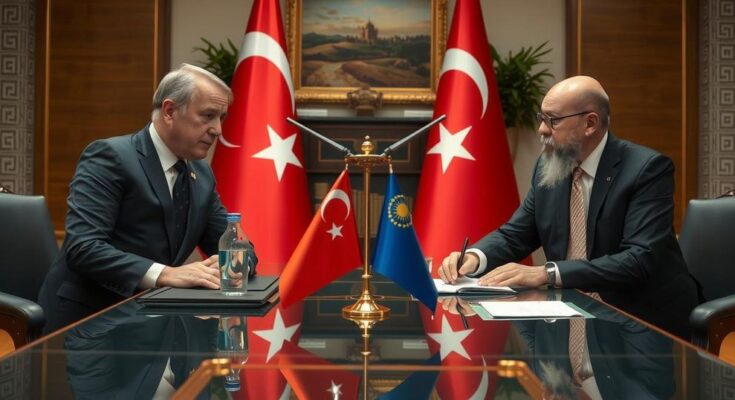Turkish Foreign Minister Hakan Fidan met with Syrian leader Ahmed al-Sharaa to discuss supporting Syria’s new administration post-Assad. This interaction signifies Turkey’s strategic shift in diplomacy amid conflict, focusing on restructuring Syria and addressing the Kurdish YPG militia threat. The Syrian Democratic Forces face challenges to their control in the changing political landscape of post-Assad Syria.
On Sunday, in a significant diplomatic move, Turkey’s Foreign Minister Hakan Fidan convened with Ahmed al-Sharaa, also referred to as Abu Mohammed al-Golani, the leader of the Islamist group Hayat Tahrir al-Sham, in Damascus. This meeting aimed to discuss the support for Syria’s new administration in the wake of the recent fall of Bashar al-Assad, reflecting Turkey’s strategic interest in reshaping Syria’s governance. Photographs released by the Turkish Foreign Ministry depicted a cordial exchange between Fidan and Sharaa, marked by handshakes and smiles before a large delegation.
President Tayyip Erdogan announced Turkey’s commitment to assist Syria in establishing a new state structure and drafting a constitution, indicating further diplomatic engagements with Damascus. Prior to Fidan’s visit, Ibrahim Kalin, the head of Turkey’s intelligence agency MIT, also traveled to Damascus shortly after Assad’s ousting.
Historically, Turkey has supported factions opposing Assad’s regime, and this diplomatic engagement comes amid ongoing military confrontations in northeast Syria between Turkey-aligned groups and the Kurdish YPG militia, considered by Ankara as a terrorist organization. Turkey’s defense minister has expressed confidence that the new Syrian leadership, which includes the Ankara-backed Syrian National Army, will action to remove YPG presence from the northeastern territories.
With Turkey maintaining extensive control over various Syrian border regions and sustaining military operations against Kurdish forces, the power dynamics in the region appear to be shifting post-Assad’s rule. The Kurdish-led Syrian Democratic Forces are now facing threats to their territorial gains, which have been in jeopardy since the establishment of a more favorable leadership for Turkey in Syria.
Turkey has played a pivotal role in shaping the dynamics of the Syrian conflict, especially as it provided support to various rebel factions seeking to usurp Bashar al-Assad’s authoritarian regime. Following the recent overthrow of Assad, there is an apparent push by Turkey to influence the formation of Syria’s new political landscape. While Ankara has engaged with groups such as Hayat Tahrir al-Sham, it continues to combat the Kurdish YPG militia in northern Syria, which Turkey regards as a terrorist organization due to its connections to the PKK (Kurdistan Workers’ Party). The fall of Assad marks a significant turning point in the ongoing Syrian civil war, creating renewed opportunities and challenges for regional actors including Turkey.
In summary, the recent meeting between Turkey’s Foreign Minister Hakan Fidan and Syria’s de facto leader Ahmed al-Sharaa signifies a critical phase in Turkey’s involvement in post-Assad Syria. With Turkey’s stated objective to assist in establishing a new quasi-government and addressing the presence of the YPG militia, the evolving situation presents both opportunities for diplomatic engagements and the potential for military confrontations. The geopolitical landscape in the region continues to transform, as various factions vie for influence and control.
Original Source: www.hindustantimes.com




